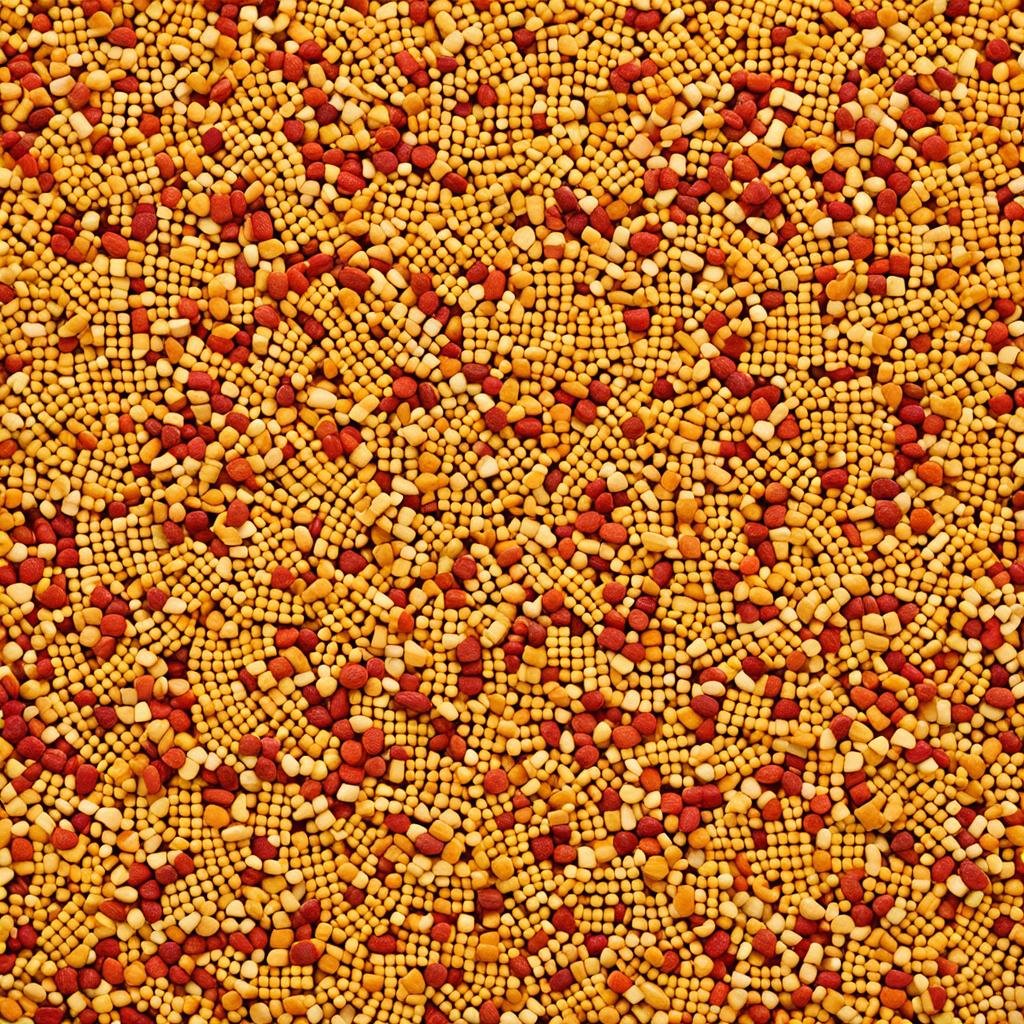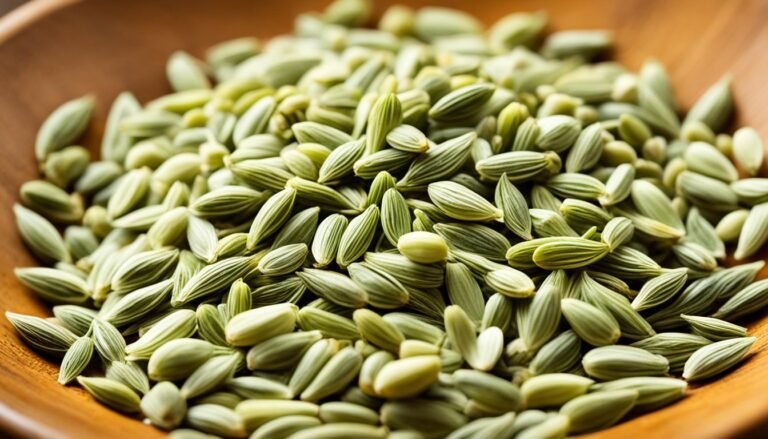Fenugreek’s Impact on Your Menstrual Cycle

Did you know that up to 88% of women worldwide struggle with menstrual pain and discomfort? This fact shows how common menstrual cycle issues are, from cramps and heavy bleeding to irregular cycles and hormonal imbalances. If you’re looking for natural ways to manage your period, the fenugreek plant could be the answer you need.
Fenugreek (Trigonella foenum-graecum) is a clover-like herb from the Mediterranean and parts of Asia. For centuries, it has been used in traditional herbal medicine for women’s health. This article will look into how fenugreek can affect the menstrual cycle, reduce menstrual cramps, and help with hormonal balance. We’ll also cover the right dosage, possible side effects, and how to add fenugreek to a healthy diet.
What is Fenugreek?
Fenugreek is a plant that has been used for centuries in cooking and medicine. It belongs to the Fabaceae family. The fenugreek plant has small white flowers and long, slender pods with small, hard brown fenugreek seeds. Both the fenugreek seeds and dried fenugreek leaves are used in traditional medicine in South Asia, the Middle East, and the Mediterranean.
The fenugreek plant has compounds like trigonelline, diosgenin, and 4-hydroxyisoleucine. These are thought to help with health issues such as menstrual problems, diabetes, and boosting breast milk production. Researchers have looked into how fenugreek can help with these conditions.

If you want to add fenugreek to your cooking or look into its health benefits, learning about it can be helpful. This ancient herb is versatile and could be a good addition to your health routine.
Fenugreek and Menstrual Cramps Relief
Fenugreek may help women with menstrual health by easing menstrual cramps, or dysmenorrhea. Studies show that fenugreek seed extracts or powders could lessen the pain of these cramps. This is because they might have anti-inflammatory effects.
Studies on Fenugreek’s Anti-Inflammatory Effects
A study in the Journal of Ethnopharmacology found fenugreek leaf extract helped with pain and inflammation in animals. Another study showed women taking fenugreek supplements felt less pain and needed less pain medicine.
This study had 106 patients, split into two groups. 51 were given fenugreek and 50 got a placebo. 101 patients finished the study, showing a good completion rate. Pain went down in both groups after two cycles, but more so in the fenugreek group.
After each cycle, the fenugreek group had less pain than the placebo group. The fenugreek group also had shorter pain periods. By the end, they used less pain medicine than the placebo group.
Fenugreek seeds are full of nutrients that can ease period cramps. They have fiber that calms the gut, reducing inflammation and pain. They also have bioflavonoids that fight inflammation and lower oxidative stress during menstruation.

Regulating Hormones with Fenugreek
Fenugreek is a versatile herb that may help with hormonal imbalances. It contains diosgenin, which has a mild effect on estrogen. This could help balance hormone levels and improve menstrual cycle regularity.
Studies suggest that fenugreek can increase testosterone levels in women. This is good for sexual function and reproductive health. A study found that a fenugreek supplement improved sexual problems by 41.6% and irritability by 40% compared to a placebo.
Research on fenugreek’s effects on hormones is promising. A study with 48 healthy women showed significant improvements in estradiol, total testosterone, and free testosterone levels for those with low levels at first. They took a 250 mg fenugreek supplement twice a day for 42 days.
This study also found that fenugreek had a weak effect on estrogen. It didn’t change progesterone or follicle-stimulating hormone (FSH) levels much. This means fenugreek might selectively modulate certain hormones without upsetting the balance.

The protodioscin content in the supplement is similar to dehydroepiandrosterone (DHEA). This suggests it could help balance hormones. Trigonelline in the supplement also boosts estrogen and improves mood by affecting serotonin levels.
While we need more research, the current studies show fenugreek’s promising role in regulating hormonal imbalances. It could help with issues like low libido, vaginal dryness, irritability, and mood swings.
fenugreek menstrual cycle
Fenugreek is a herb with a long history in traditional medicine. Researchers are now looking into how it might affect the menstrual cycle. They think it could help regulate cycles and ease symptoms like PMS.
A study in the Journal of Pharmacy and Pharmaceutical Sciences showed fenugreek seed powder helped women. It made their cycles more regular and eased symptoms like mood swings, bloating, and cramps. It might also help women with PCOS, a condition that affects hormone balance and can cause irregular periods.
Fenugreek contains compounds like saponins and phytoestrogens. These might help balance hormones and ease menstrual problems. By supporting hormone balance, fenugreek could reduce symptoms of irregular periods, PMS, and PCOS.
| Menstrual Condition | Incidence Rate |
|---|---|
| Menorrhagia (heavy bleeding) | 100.9 per 10,000 person-years |
| Uterine Fibroids | 63.2 per 10,000 person-years |
| Endometriosis | 30.8 per 10,000 person-years |
| Polycystic Ovary Syndrome (PCOS) | 25.3 per 10,000 person-years |
While studies on fenugreek and the menstrual cycle look promising, it’s key to talk to a healthcare pro before trying it. This is especially true if you have health issues or are on medication.

Dosage and Preparation
To use fenugreek for menstrual issues, there are several ways to add it to your routine. For menstrual cramps, take 1,800-2,700 mg of fenugreek seed powder three times a day for the first three days of your cycle. Then, take 900 mg three times a day for the next two days.
You can also make a soothing tea with fenugreek. Boil 2 teaspoons of seeds in 2 cups of water for 3-4 minutes. Strain the liquid and add lemon, honey, or sugar for taste. Drinking this tea can ease menstrual issues and help with menstrual cramp relief.
How to Take Fenugreek for Menstrual Benefits
For menstrual benefits, follow the recommended dosage for fenugreek supplements. Take 1,800-2,700 mg of fenugreek seed powder three times a day for the first three days of your cycle. Then, reduce to 900 mg three times a day for the next two days. Fenugreek tea is another option, using 2 teaspoons of seeds in 2 cups of water for 3-4 minutes.
Pregnant or breastfeeding women should talk to their healthcare provider before taking fenugreek supplements. The safety for these groups is not fully known. Always start with a low dose and watch how your body reacts.

Potential Side Effects and Precautions
Fenugreek is usually safe when eaten in small amounts. But, taking more than the recommended dose can lead to fenugreek side effects. These may include stomach issues like bloating, gas, and diarrhea. Some people might also have allergic reactions. Fenugreek may also interact with certain medications, such as blood thinners, diabetes drugs, and birth control pills.
Pregnant and breastfeeding women should not take fenugreek supplements. There’s not enough information on their safety. People allergic to legumes should also avoid it. Always talk to a healthcare provider before using fenugreek, especially if you have health issues or take other medicines.
- Common fenugreek side effects include diarrhea, stomach upset, gas, and a “maple syrup” odor in the urine.
- Fenugreek is considered possibly safe when taken for a short period, but long-term use may lead to more severe side effects.
- Fenugreek can affect blood clotting and may increase the risk of bleeding, particularly before surgery, dental work, or medical procedures.
- Fenugreek interactions are possible with medications like diabetes drugs, blood thinners, and estrogen-based contraceptives.
- Fenugreek contraindications include pregnancy, breastfeeding, and known legume allergies.
Always talk to your healthcare provider before adding fenugreek to your routine. This ensures your safety and helps manage any fenugreek side effects or concerns.
Fenugreek and Overall Women’s Health
Fenugreek is known for its benefits for women’s health, especially for menstrual health. It may also help with breast milk production, female fertility, and sexual health. The research is still growing, but the potential benefits are promising.
Fenugreek and Breast Milk Production
A study in 2018 found that fenugreek can increase breast milk production. Many moms have used fenugreek supplements or tea to help with milk supply. But, it’s important to talk to a healthcare provider before trying it.
Fenugreek and Female Fertility
Fenugreek may help with female fertility by balancing hormones. It could also boost libido and sexual function. But, we need more studies to be sure of these benefits. Pregnant women should not use fenugreek as it can cause early labor and miscarriage.
Potential Side Effects and Precautions
Using fenugreek can have side effects like diarrhea, gas, and more asthma symptoms. It can also make you sweat more. If you have certain health issues or take certain medicines, talk to your doctor before using it. Always choose high-quality supplements and follow the directions.
The benefits of fenugreek for women’s health are still being studied. This herb could support many areas of health. Always talk to a healthcare professional before using fenugreek or any supplements, especially if you have health concerns.
Integrating Fenugreek into Your Diet
Adding fenugreek to your meals and drinks is easy and can be beneficial for your health. You can use the seeds or leaves in many dishes. This adds a unique flavor and boosts nutrition.
Fenugreek Recipes and Meal Ideas
- Add fenugreek seeds, whole or ground, to curries, stews, and soups for an earthy, slightly sweet taste.
- Sprinkle fenugreek powder on roasted vegetables, salads, or omelets for a nutritional boost.
- Brew a soothing fenugreek tea by steeping the seeds in hot water and sweetening it to your preference.
- Incorporate fenugreek leaves, fresh or dried, into vegetable dishes, lentil curries, or egg preparations.
Start with a little fenugreek in your cooking to avoid stomach issues. Try different ways to prepare it to find your favorite flavors and health benefits.
| Fenugreek Nutrition Facts (1 Tbsp) | Amount |
|---|---|
| Calories | 35.9 |
| Protein | 2.55g |
| Fiber | 2.73g |
| Carbohydrates | 6.48g |
| Iron | 3.72mg |
Adding fenugreek to your diet is a great way to support your health. Try different recipes and methods to find what you like best.
Conclusion
Fenugreek is a versatile herb that has been used in traditional medicine for a long time. It’s known for its benefits related to women’s health, especially for fenugreek menstrual benefits. Studies show it may ease menstrual cramps, balance hormones, and support women’s reproductive and sexual health.
Even though more research is needed, adding fenugreek for women’s health to your diet or as a supplement could be natural. It might help some women manage menstrual issues and improve overall wellness.
Before starting any new supplement, including fenugreek natural remedies, talk to a healthcare provider. This is crucial if you have health conditions or are pregnant or breastfeeding. Fenugreek has promising research and traditional use, making it a potential ally for better menstrual and reproductive health.
Adding fenugreek to your life could ease menstrual discomfort and boost your overall health. This way, you can feel your best during your cycle and beyond.
FAQ
How can fenugreek help with menstrual cramps?
Fenugreek has anti-inflammatory properties that can lessen menstrual cramp severity. Studies show that its seed extracts or powders can ease menstrual pain. This reduces the need for painkillers.
Can fenugreek help regulate hormonal imbalances?
Yes, fenugreek’s active compounds, like diosgenin, have a mild estrogenic effect. This can balance hormone levels and make menstrual cycles more regular. It may also increase testosterone levels in women.
How can fenugreek influence the menstrual cycle?
Fenugreek can help regulate menstrual cycles and ease PMS symptoms like mood swings, bloating, and cramps. It’s also good for women with PCOS.
What is the recommended dosage of fenugreek for menstrual benefits?
For menstrual cramp relief, take 1,800-2,700 mg of fenugreek seed powder three times a day for the first three days of your cycle. Then, take 900 mg three times a day for the next two days. You can also drink fenugreek tea.
Are there any side effects or precautions to be aware of when using fenugreek?
Fenugreek may cause stomach issues like bloating, gas, and diarrhea, or allergic reactions. It could also interact with blood thinners, diabetes drugs, and birth control pills. Pregnant and breastfeeding women should not take fenugreek supplements.
How can I incorporate fenugreek into my diet?
You can add fenugreek seeds or leaves to many dishes. Use the seeds whole or ground in curries, stews, breads, or on salads. The leaves can be used fresh or dried in soups, vegetable dishes, or omelets.






